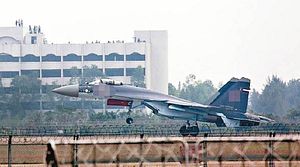The U.S. Department of State said on Thursday that it would immediately impose sanctions on China for purchasing Russian military hardware in breach of the congressionally mandated Countering America’s Adversaries Through Sanctions Act (CAATSA) which came into effect in January 2018 and which decrees the imposition of mandatory economic sanctions on countries importing Russian military hardware.
In detail, the State Department stated that it, along with the U.S. Department of the Treasury, would impose sanctions on the People’s Liberation Army’s (PLA) Equipment Development Department (EDD), which is part of the Chinese Military Commission and charged with research and development as well as the procurement of defense equipment for the PLA, for the procurement of S-400 Triumf air defense systems (NATO reporting name: SA-21 Growler) and Sukhoi Su-35S (NATO reporting name: Flanker-E) fourth generation, twin-engine, multirole fighter aircraft.
“We took these actions because China took delivery of 10 Sukhoi fighter aircraft, specifically Su-25s [sic], in December of 2017 – of course, after the CAATSA statute came into force,” a senior Trump administration official said on Thursday. “And it also took delivery of a batch of S-400 – sometimes known as SA-21 – surface-to-air missile systems or related equipment in January of this year.” Notably, China is being sanctioned for taking delivery of these systems and not for the conclusion of the sales contracts with Russia as both countries signed the $2 billion contract for 24 Su-35 fighter aircraft already in November 2015 and the $3 billion S-400 deal in March or April 2015.
The sanctions imposed on EDD and its director Li Shangfu entail the denial of export licenses and a prohibition on transactions with the U.S. financial system, among others.
“China expresses strong indignation at these unreasonable actions by the U.S. side and has already lodged stern representations,” Chinese Foreign Ministry spokesman Geng Shuang told reporters in Beijing on September 20. “We strongly urge the U.S. side to immediately correct the mistake and rescind the so-called sanctions, otherwise the U.S. side will necessarily bear responsibility for the consequences,” he added. The PLA is in the process of inducting its first regimental set of S-400 and has been testing it over the summer. Su-35 have already participated in a couple of military exercises including long-range aerial patrols over the Bashi channel and the island of Taiwan.
Meanwhile, the U.S. and India are continuing to discuss the latter’s intended procurement of five S-400 regiments and a possible CAATSA sanctions waiver. This year’s U.S. National Defense Authorization Act (NDAA) grants the Trump administration authority to waive mandatory sanctions under CAATSA in certain circumstances pertaining to Russian legacy military systems that costs less than $15 million. The S-400 contract between China and Russia is expected to be signed during a summit meeting between Indian Prime Minister Narendra Modi and Russian President Vladimir Putin scheduled for October 5.
Given that the delivery of the S-400 systems is not expected for many years, the Trump administration may choose to ignore the conclusion of a sales agreement between the two countries next month and postpone any political sensitive decision that may detrimentally impact India-U.S. relations for the time being. The senior administration officials also did not specifically name India during the conference call on September 21.
“As to other potential recipients of the S-400, we haven’t made any determinations yet with respect to what to do about those, but you can be confident that we have spent an enormous amount of time talking about prospective purchases of things such as S-400s and Sukhois with people all around the world who may have been interested in such things and some who may still be,” the senior administration official said on September 20. “We have made it very clear to them that these – that systems like the S-400 are a system of key concern with potential CAATSA implications.”































